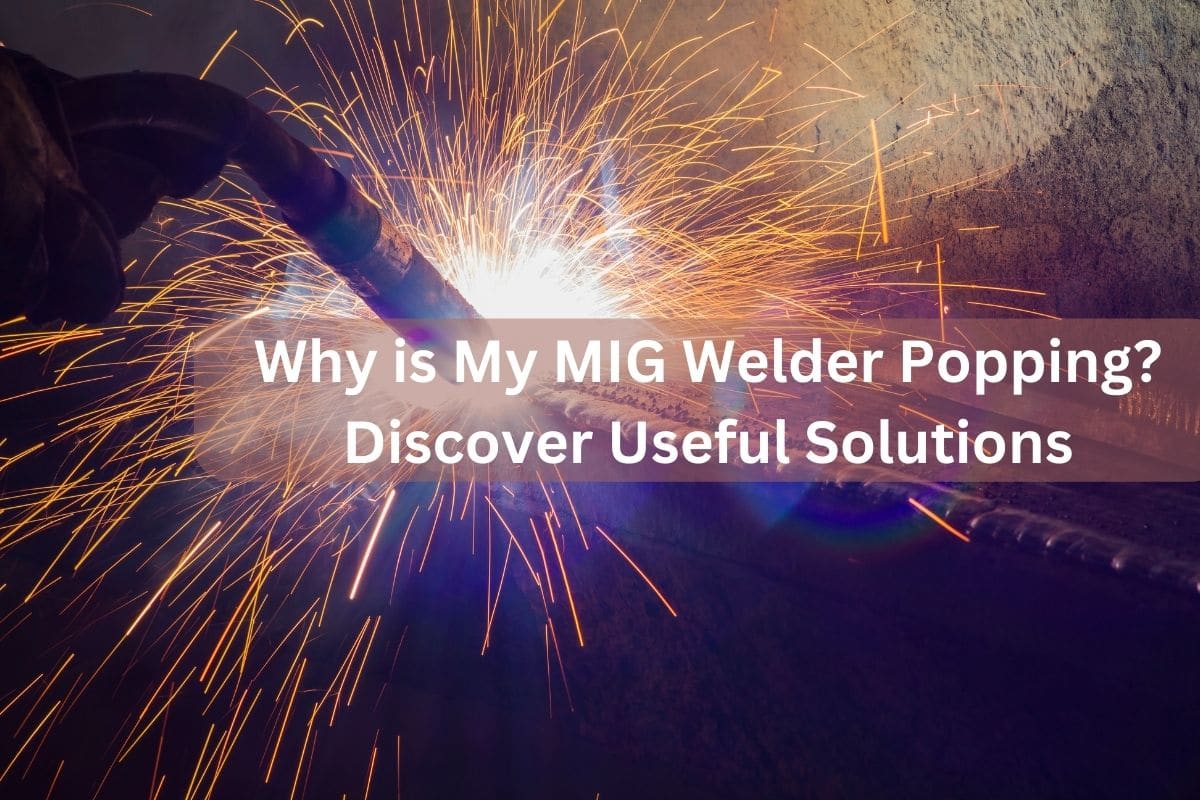“Why is my MIG welder popping?” If you’ve found yourself pondering this question, you’re not alone. This is a common concern in the realm of MIG welding, particularly for those just starting their journey.
The popping sound from your MIG welder can be more than just a nuisance; it can significantly impact the quality of your welds.
This guide is designed to answer the question, “Why is my MIG welder popping?”, by exploring the root causes of this issue and providing practical solutions to mitigate it.
So, let’s dive into the intricacies of MIG welding and unravel this common welding challenge.
Understanding MIG Welder Popping
What is MIG Welder Popping?
MIG welder popping is a common issue encountered in the welding process, particularly for those new to MIG welding.
This phenomenon is characterized by a series of popping sounds during welding, which is not only distracting but also indicative of potential problems.
The result of this popping is often a poor quality weld with a high failure rate.
But what causes this popping sound?
Let’s explore the reasons behind it.
Why is My MIG Welder Popping?
Understanding why your MIG welder is popping is the first step towards resolving the issue.
There are several reasons why this might be happening:
- Wrong Wire Speed: One of the most common reasons for MIG welder popping is incorrect wire speed. If your MIG gun is feeding the wire too fast or too slow, it can lead to popping. A fast wire speed results in random popping with no consistent rhythm, while a slow wire speed causes consistent, rhythmic popping sounds.
- Material Thickness: The thickness of the pieces you’re welding together can also cause popping. As the metal thickness increases, you need to slow down your weld speed, assuming the same wire speed and voltage.
- Wrong Wire Size: The diameter of the wire you’re using can contribute to your MIG welder popping. Thinner wire requires you to move faster to prevent the wire from melting away from the weld pool.
- Incorrect Amperage / Voltage Setting: An incorrect amperage or voltage setting will cause a lot of problems with your MIG welding, including popping.
- Running Out of Shielding Gas: If you’re MIG welding with gas (GMAW) and start to run out, the gas shielding around the arc will fail and you’ll start to get popping and oxidation in the weld.
- Worn or Mis-Adjusted Wire Feed Mechanism: Over time, the wheels that feed the wire through the gun can wear out and lose their grip on the wire, causing wire slippage. This results in inconsistent wire speed and lots of popping.
- Tangled MIG Wire: It’s very common for MIG wire to snag or kink slightly in the feeding mechanism and cause a backup, which can lead to popping.
- Using the Wrong Type of Wire: If you change work pieces and unintentionally use the wrong wire for the metal, all kinds of popping, smoking, and spattering is likely to ensue.
By understanding these causes, you can start to take steps towards preventing MIG welder popping and improving the quality of your welds.
Read Also : Unbelievable Reasons Why is My MIG Welder Sputtering
But how exactly can you do this?
Let’s move on to the next part of our guide to find out.
Preventing MIG Welder Popping
How Can I Prevent My MIG Welder From Popping?
Having explored the question, “Why is my MIG welder popping?” in the previous section, it’s time to delve into the solutions.
Here are some practical steps to help you address the issue of your MIG welder popping:
- Begin With the Manufacturer Recommended Settings: One of the first steps to answer the question, “Why is my MIG welder popping?” is to check if you’re following the manufacturer’s guidelines. Always start with the recommended amperage/voltage settings, wire type, diameter, and wire speed that match the metal type and thickness you’re welding.
- Ensure the Right Amperage or Voltage: Adhering to the manufacturer’s suggested settings is crucial. The correct amperage/voltage settings for the metal type and thickness will help you avoid an overly hot or cold arc, which can lead to popping and splatter problems.
- Select the Correct Wire and Wire Speed: Most manufacturers provide a wire size vs. metal thickness chart inside the access door of the machine and in the user manual. After setting up your MIG with the appropriate spool of wire, adjust the wire speed until you achieve a constant buzz or sizzle without any popping.
- Maintain the Correct Distance With the Gun Tip: Most MIG welders operate optimally when the tip is around 1/2″ to 1″ from the joint you’re welding. Maintaining this distance can help prevent popping and oxidation of the weld bead.
- Inspect the Contact Tip, Gun Feed Liner, and Wire: If you’re still asking, “Why is my MIG welder popping?” even after following the above steps, it’s time to check these areas. Ensuring a well-maintained welding gun and clean, rust-free wire can significantly enhance the quality of your welds and reduce popping.
By implementing these steps, you can significantly decrease the occurrence of MIG welder popping, leading to improved weld quality and a smoother welding experience. Remember, practice and continual refinement of your technique are key.
Now, are you ready to tackle your next welding project with these insights in mind?
Read Also : Welding Slang: Discover the Useful Professional Terms
Conclusion
In the world of MIG welding, the question “Why is my MIG welder popping?” is a common one.
This issue can be a significant hurdle, but with the right understanding and preventative measures, it’s a problem that can be overcome.
By recognizing the causes of MIG welder popping and applying the solutions we’ve discussed, you can enhance the quality of your welds and ensure a more seamless welding experience.
It all starts with using the correct settings, the right wire and wire speed, maintaining an optimal distance with the gun tip, and keeping your equipment in top condition.
So, the next time you find yourself asking, “Why is my MIG welder popping?”, remember the steps we’ve outlined here.
They’re your key to mastering MIG welding and producing high-quality, durable welds.
Now, what measures will you implement to prevent MIG welder popping in your upcoming projects?


